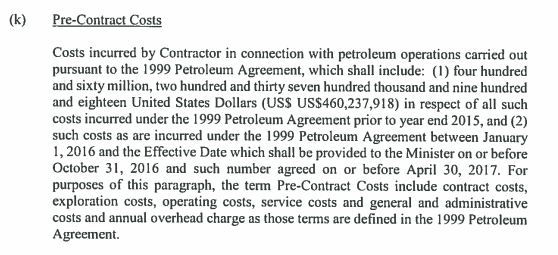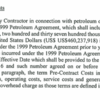By Kiana Wilburg
IHS Markit Limited, a London-based firm, has been recruited by the Energy Department to audit billions of dollars ExxonMobil and its partners said, they invested in the Stabroek Block and will move to recover starting next year.
ExxonMobil says it has racked up approximately US$960M in exploration costs. It will also try to reclaim about US$3.7B more for development costs for the Liza Phase One Project.
In its Expression of Interest (EOI), the London based firm stated that it has the deepest source of information, analytics and solutions for the major industries such as oil, while noting that it has provided its expertise to clients in over 165 countries for more than 50 years. The company further stated that it understands the holistic impact of costs on upstream operations.
In terms of what it is bringing to the table for Guyana, IHS said that it has a comprehensive global database of exploration and production costs. It said that this data includes local and regional costs at the component level so as to allow for detailed comparisons.
IHS also said that it has developed proprietary software solutions and tools to gain insights into costs faced in the exploration and production sector. It said that it uses cost estimation tools such as Que$tor and Vantage paired with its rich databases to provide industry leading cost analysis.
Kaieteur News understands that the firm will be working along closely with the officials of the Guyana Revenue Authority (GRA) on these and other related audits.
UNREASONABLE OR UNJUSTIFIABLE COSTS
Earlier this year, Petroleum Advisor to the Government, Matthew Wilks, categorically stated that if oil companies rack up costs, which are exorbitant and unjustifiable, Guyana will not be paying those costs, while noting that the power of the government is in cost recovery audits. He had said that this is the case whether it is for the controversial US$960M pre-contract costs and any costs going forward.
Wilks had specifically said, “Let me just put it very bluntly, if anyone tries to charge costs which are unwarranted or not benchmarked to norms, or are excessive, the Department will reject them. That is the purpose of cost recovery audits. It is not merely to sign off on costs. It is to say no under the right circumstances. So ‘no’ will be said when we look at costs.”
The Petroleum Advisor continued, “That is the whole purpose of getting qualified companies who have experience in auditing, who have benchmarking capabilities. It is such that they can look at the costs and they can benchmark them, they can tell the government if the cost is excessive or in the right order.”
He added, “If anything is excessive and there is no good reason for it being done, it will be disallowed and that is a risk to any operator. If an operator spends too much or gold plates or doesn’t seek cost efficiency, it might be spending its own money and not the government’s because we will disallow it, pure and simple!”
US$960M PRE-CONTRACT COSTS
International lawyer, Melinda Janki, was one of the first persons to note that the country is neck-deep in US$960M worth of pre-contract costs.
During a panel discussion that was held on Guyana’s oil contract with ExxonMobil at Moray House, Janki reminded that the country has to pay US$460M in pre-contract costs. This covers the period 1999 to 2015. But there is a second lot.
Janki noted that the contract specifically states that Guyana is to pay contract costs from January 2016 to when the deal was signed on October 7, 2016.
The international lawyer had said, “The costs for the whole of 2016 were about US$583M and if you apportion it to October, you get roughly US$400M. Again, Minister of Natural Resources, Raphael Trotman has agreed for Guyana to pay this. As at October 7, 2016, Government’s attempt to sell our oil costs us US$960M. I have found no law which gives the minister the authority to burden the nation with this, so it is quite possible that he acted illegally.”
See link for more details: https://www.facebook.com/jerom



